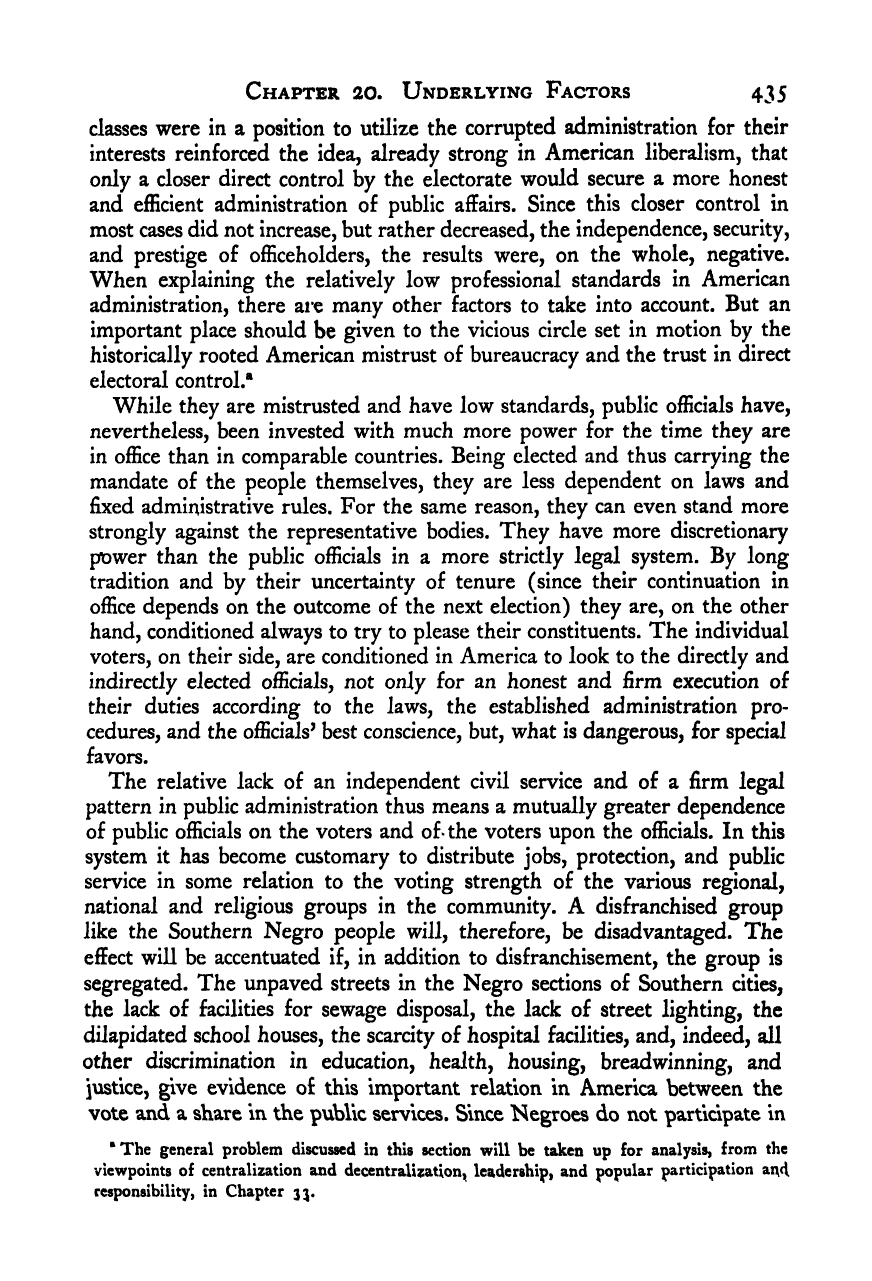Note: Gunnar Myrdal died in 1987, less than 70 years ago. Therefore, this work is protected by copyright, restricting your legal rights to reproduce it. However, you are welcome to view it on screen, as you do now. Read more about copyright.
Full resolution (TIFF) - On this page / på denna sida - V. Politics - 20. Underlying Factors - 2. The Wave of Democracy and the Need for Bureaucracy

<< prev. page << föreg. sida << >> nästa sida >> next page >>
Below is the raw OCR text
from the above scanned image.
Do you see an error? Proofread the page now!
Här nedan syns maskintolkade texten från faksimilbilden ovan.
Ser du något fel? Korrekturläs sidan nu!
This page has never been proofread. / Denna sida har aldrig korrekturlästs.
Chapter 20. Underlying Factors 435
classes were in a position to utilize the corrupted administration for their
interests reinforced the idea, already strong in American liberalism, that
only a closer direct control by the electorate would secure a more honest
and efficient administration of public affairs. Since this closer control in
most cases did not increase, but rather decreased, the independence, security,
and prestige of officeholders, the results were, on the whole, negative.
When explaining the relatively low professional standards in American
administration, there are many other factors to take into account. But an
important place should be given to the vicious circle set In motion by the
historically rooted American mistrust of bureaucracy and the trust in direct
electoral control.®
While they are mistrusted and have low standards, public officials have,
nevertheless, been invested with much more power for the time they are
in office than in comparable countries. Being elected and thus carrying the
mandate of the people themselves, they are less dependent on laws and
fixed administrative rules. For the same reason, they can even stand more
strongly against the representative bodies. They have more discretionary
power than the public officials in a more strictly legal system. By long
tradition and by their uncertainty of tenure (since their continuation In
office depends on the outcome of the next election) they are, on the other
hand, conditioned always to try to please their constituents. The individual
voters, on their side, are conditioned In America to look to the directly and
indirectly elected officials, not only for an honest and firm execution of
their duties according to the laws, the established administration pro-
cedures, and the officials’ best conscience, but, what is dangerous, for special
favors.
The relative lack of an independent civil service and of a firm legal
pattern in public administration thus means a mutually greater dependence
of public officials on the voters and of- the voters upon the officials. In this
system it has become customary to distribute jobs, protection, and public
service in some relation to the voting strength of the various regional,
national and religious groups in the community. A disfranchised group
like the Southern Negro people will, therefore, be disadvantaged. The
effect will be accentuated if, in addition to disfranchisement, the group is
segregated. The unpaved streets in the Negro sections of Southern cities,
the lack of facilities for sewage disposal, the lack of street lighting, the
dilapidated school houses, the scarcity of hospital facilities, and, indeed, all
other discrimination in education, health, housing, breadwinning, and
justice, give evidence of this important relation in America between the
vote and a share in the public services. Since Negroes do not participate in
*The general problem discussed in this section will be taken up for analysis, from the
viewpoints of centralization and decentralization^ leadership, and popular participation ai\d
responsibility, in Chapter 35.
<< prev. page << föreg. sida << >> nästa sida >> next page >>